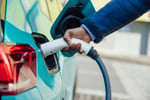By Ashley Barnett, head of consultancy at Lex Autolease
In its Road to Zero strategy (released in 2018), the government set a target for all new car and van registrations to have zero emissions by 2040.
The Climate Change Committee’s (CCC) desire to bring this forward to 2030 would undoubtedly support its ambition for the UK to be a net zero emissions nation by 2050.
However, something of a revolution is required for this to be possible – particularly given that Scotland has now committed to an even more ambitious target of 2045.
Drivers who buy a new car typically own it for four years, which means 2030 could be three renewal cycles or less away for many.
Pure electric vehicles (EVs) had just 0.9% market share at the end of Q1 2019 and accounted for just 0.85% of all new cars registered from January to March – the equivalent of approximately 6,000 cars on the road.
If all new vehicles are to be effectively zero-emission by 2030, that means we need to reach 2.6 million EVs in just over a decade – an extremely ambitious goal.
Investment will be needed in technology, infrastructure and incentives, as well as evolving the tax environment in order to secure the buy-in of both businesses and individual drivers.
According to the CCC report, PHEVs in Norway hit 47% of total new vehicle sales in the 12 months leading up to 2018, making the country a world leader in take-up of the technology.
This success is largely down to the tax advantages that reduce the upfront cost of purchasing an EV, as well as the appeal of in-life benefits such as free parking, road tolls and access to charging points.
To drive similar take-up in the UK, incentives will be key. Cash grants and tax deductions may need to be maintained in the short to medium term if a “tipping point” is to be reached in new vehicle sales.
As the country’s leading vehicle leasing provider, we have an important role to play and announced our £1m EV1000 initiative at the international Zero Emission Summit last year.
Launched in January, the initiative will provide £1,000 cashback on the first 1,000 eligible EV orders placed this year.
Confirmation of the taxes applicable in the company car market would also help stimulate demand, which in turn will supply the second-hand market for EVs.
As cleaner vehicles come to market, the current tax regime may disproportionately impact less well-off users, who may be unable to afford newer, more efficient technology.
Drivers in this category could easily find themselves contributing more than someone who is financially able to opt for a lower-emission option.
Fleets have traditionally been the pioneers of new technology and can contribute significantly towards efforts to reduce emissions. From the rise of Euro 6 diesels to the introduction of PHEVs and EVs, we’ve been helping our customers make the transition to cleaner technology for a long time.
If market conditions are made more favourable, fleet managers will continue to place orders for EVs and can drive behavioural change more widely.
While we’re pleased to have fleet clients discussing the substantial use of EVs for a greener future (one moving 20% of its fleet to EV by 2020) vehicle range is still relatively low compared to petrol or diesel alternatives and, for some, current charging infrastructure isn’t sufficient to meet their needs.
The CCC report estimates that 210,000 public chargers are needed across towns and cities to support the wider uptake of EVs – meaning the extent of current public charging infrastructure would need to increase ten times over.
The transition towards a net-zero future will be exactly that – starting with lower mileage users for whom an Ultra Low or Zero Emission Vehicle is already appropriate and rolling out more widely as battery technology and charging infrastructure develop and improve.
The focus must be on getting the right vehicle, for the right job, and building the Road to Zero – in which the fleet industry can play a crucial role.

















rosco7 - 07/05/2019 15:41
So the value of property that has off road parking, and as such the ability to use cheap domestic electricity to charge the EV will rocket. Those unfortunate enough not to have this facility will end up paying inflated electricity prices to "fuel" their vehicles. The government has some good ideas and the target is challenging but achievable. However, they need to be working quickly to resolve some issues. And at the moment, using a motorway services to charge your EV is about three times more expensive than domestic supply.